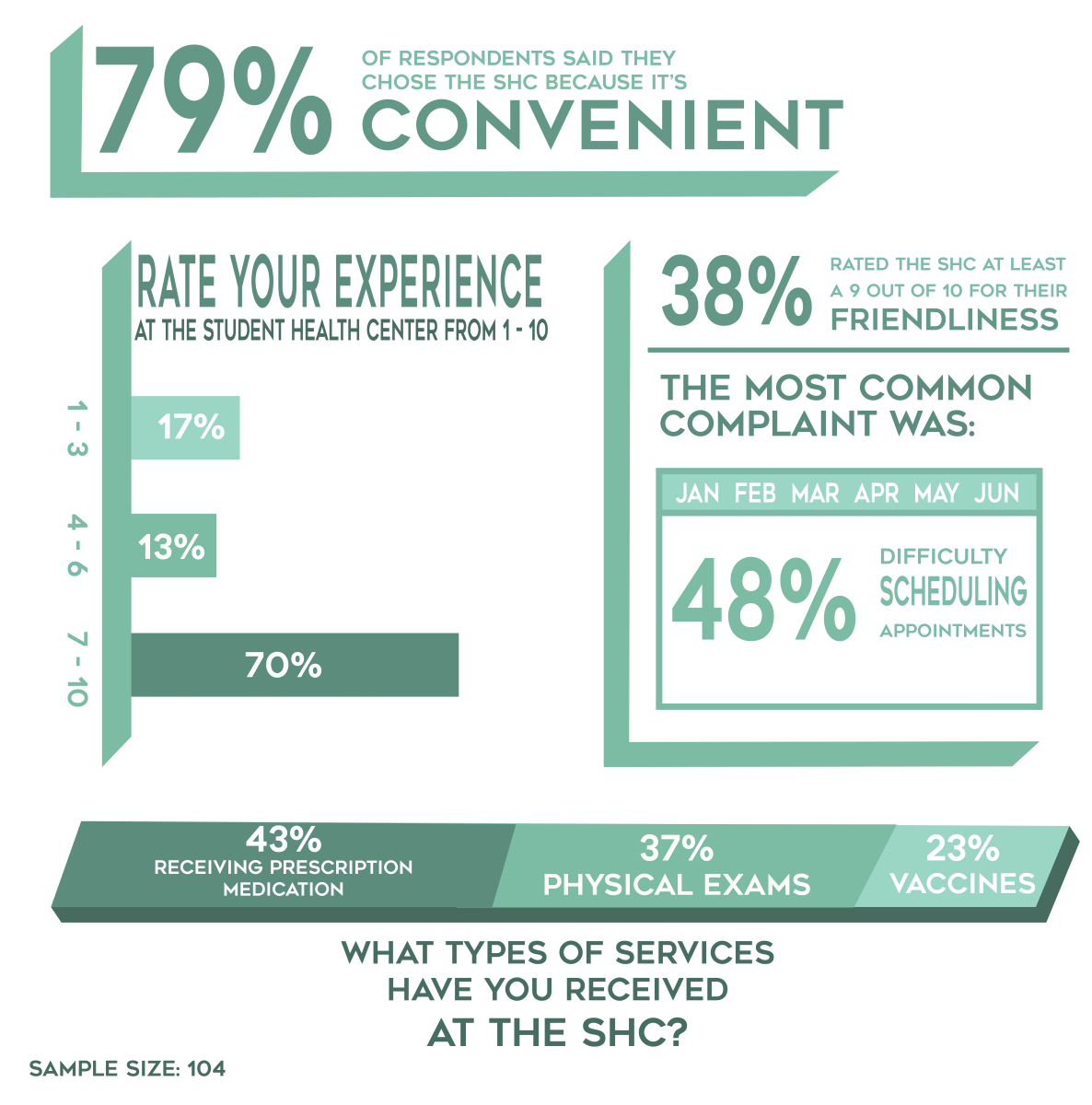
Graphic by Samantha Lopez | Mercury Staff
Students report late fees, convenience of center
The Student Health Center provides a range of medical
services from blood work to prescribing birth control, but despite its
benefits, students have given the center mixed reviews.
Criminology senior Simone Sanborn has been a regular patient
at the SHC since her freshman year at UTD, and said she has had positive
experiences with both staff and medical professionals during her visits. Like
other students who aren’t from the Dallas area, Sanborn goes to the SHC during
the school year because of its location on campus, and has been going since
freshman year.
“I have a chronic illness so I’m in there every three months
at least,” Sanborn said. “My primary care physician is in central Texas, so
it’s not at all feasible to go down there, so I kind of switched all of my
prescriptions and general health appointments slowly in my freshman year to the
clinic here and then I never left. There’s a lot of time dedicated to me,
everyone is very nice, I don’t ever feel rushed and they’re always very
accommodating with any questions.”
According to Google reviews, a repeated complaint that
students have with the SHC is the $25 fine that is imposed if patients with
appointments do not check in by their scheduled time. A survey of 104 students
conducted by The Mercury found that 4% of students have had to pay this fine.
Actuarial science senior Mercedes Rodriguez left a review after she had to pay
the fine.
“Most places have a small grace period for being late. I got
stuck in traffic and was 8 minutes late, tried calling but got a weird menu,”
Rodriguez wrote. “I was charged $25 for being a no-show even though I was
there. I didn’t get to see a doctor and was told to wait another hour for a new
appointment. I will never ever go there again.”
SHC Director Lea Aubrey, said that the no-show fee was
raised to $25 from $5 in order to encourage students to call ahead to cancel
appointments that were no longer needed, which would make room for other
students who need medical services, and would match the practices of other
schools in the UT system.
“We advise (students) that if you decide at any point that
you don’t need this appointment anymore, please call within the hour so we can
cancel (the appointment) without a no-show fee,” Aubrey said. “By increasing
the fee, it promoted people to call and actually cancel the appointment. I get
it, the $25, they don’t want to pay it. But what you’ll see in the community,
it’s more than that — it’s up to $50 if you miss an appointment.”
The administration has implemented changes after feedback in
the patient exit survey, including those of staff and practitioner
interactions.
“We usually survey our patients after their visits as a way
to keep on top of how we’re doing and to see, ‘What are some things we can make
better?’ and ‘What are the students saying we could do better,’” Aubrey said.
“There is constantly staff development going on whenever there is an incident
outside of annual training. We come together and talk about how we can improve.”
The SHC provides a medical care option for students without
insurance who have paid the medical service fee, which allows students to
schedule appointments without additional cost. This affordability is a
contributing factor of 29.6% of respondents who chose the SHC as a medical care
provider. The SHC minimizes student costs by working with community partners
that provide free additional services to students.
“We have free dental screening because students would come
in and ask about dental services, so we reached out to a community partner.
Another community partner comes on and they do free vision screenings,” Aubrey
said. “We also have a mobile X-ray service that is really convenient for the
student — they don’t have to leave the campus, they can get everything done
here. We work with Turning Point, a local company that provides an advocate and
a sexual assault nurse examiner.”
In addition to partnering with local service providers, the
SHC employs board-certified/licensed medical staff and patient care specialists
that directly treat patients, administrative staff, an insurance coordinator to
manage records and a consulting pharmacist. In the survey, two of the top
services respondents chose were physical exams and vaccinations, and 5 of the 104
respondents said they go to the SHC for gynecological care. The SHC is also in the process of hiring a
phlebotomist, Aubrey said, in order for the center to be more efficient.
“I always encourage our staff to have really good bedside
manners as it pertains to our clinical staff and really excellent customer
service for our front staff,” Aubrey said. “I want our students to have a
really positive experience. It is about being a really good listener, to
respect our students as young adults, making sure that we are transparent with
them, and it is to provide them with options.”